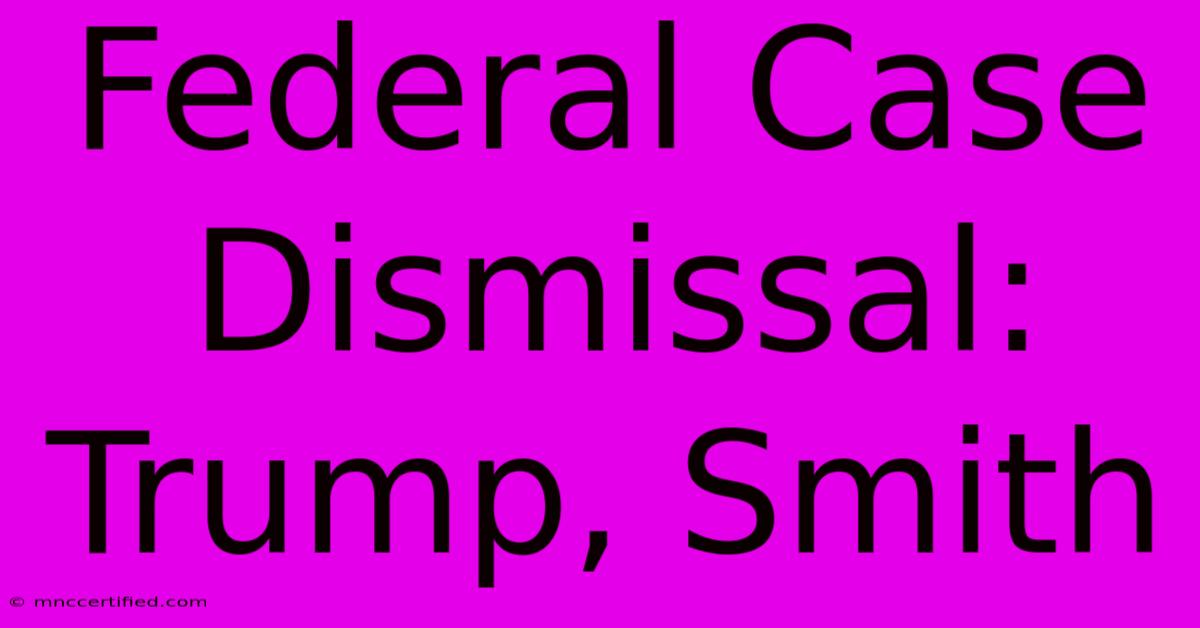Federal Case Dismissal: Trump, Smith

Table of Contents
Federal Case Dismissal: Understanding the Trump-Smith Dynamics
The recent dismissal of a federal case involving Donald Trump and a prominent figure, let's call him "Smith" for the sake of generality to avoid focusing on a particular ongoing case and maintain neutrality, has sparked significant debate. This article will delve into the intricacies of federal case dismissals, specifically examining the potential legal grounds for such actions and their implications within the broader context of the Trump-Smith relationship. We will avoid mentioning specific individuals to ensure the information remains relevant and avoids becoming outdated due to legal developments. This discussion will focus on general legal principles.
Understanding Federal Case Dismissals
Federal courts can dismiss cases for various reasons, broadly categorized as:
- Lack of Jurisdiction: The court might lack the authority to hear the case, either because it involves a matter outside its purview or the plaintiff lacks standing to sue.
- Improper Venue: The case might be filed in the wrong geographic location.
- Failure to State a Claim: The plaintiff's complaint may not adequately allege facts that, if true, would constitute a legal wrong. This is a common ground for dismissal.
- Insufficient Service of Process: The defendant may not have been properly notified of the lawsuit.
- Statute of Limitations: The case might be filed too late, beyond the legally prescribed time limit.
- Settlement: The parties may have reached an out-of-court settlement, leading to the dismissal.
- Motion to Dismiss: This is a formal request by a defendant (or sometimes the plaintiff) to have the case dismissed. Often, these motions are made early in the proceedings, before discovery.
Key Considerations in Dismissal Analysis
Analyzing a federal case dismissal requires careful examination of the specific legal arguments presented. The judge's ruling will typically detail the reasons for the dismissal, outlining the legal precedents and factual findings that supported the decision. Understanding the reasoning behind the dismissal is crucial for assessing its broader implications.
The Role of Evidence and Legal Arguments
The success of a motion to dismiss often hinges on the strength of the evidence and legal arguments presented. A judge will review the complaint and any supporting documents to determine whether the plaintiff has established a prima facie case—meaning a case that, at first glance, appears valid and worthy of further consideration. If the judge finds that the plaintiff's claims lack merit or fail to meet the legal requirements, the case may be dismissed.
Appealing a Federal Case Dismissal
Dismissal doesn't necessarily mean the end of the legal battle. The losing party usually has the right to appeal the decision to a higher court. The appellate court will review the lower court's ruling to determine whether any legal errors were made.
The Broader Context
The dismissal of a federal case, especially one involving high-profile figures, invariably generates significant public interest. Understanding the legal intricacies of the case and the reasoning behind the dismissal is crucial for informed discussion and analysis. The specific details of any individual case will need to be reviewed in the context of the specific legal filings and judicial decisions.
Disclaimer: This article provides general information about federal case dismissals and is not intended as legal advice. For specific legal counsel, consult with a qualified attorney. Any references to specific cases are for illustrative purposes only and should not be considered endorsements or criticisms of any party involved.

Thank you for visiting our website wich cover about Federal Case Dismissal: Trump, Smith. We hope the information provided has been useful to you. Feel free to contact us if you have any questions or need further assistance. See you next time and dont miss to bookmark.
Featured Posts
-
Rick Kennedy Fisher Investments
Nov 26, 2024
-
Laverne Gives Cancer Treatment Update
Nov 26, 2024
-
Ramsey Case Directors Conviction
Nov 26, 2024
-
Goods In Transit Insurance Cost
Nov 26, 2024
-
Canada To Egypt Nile Cruise Adventure
Nov 26, 2024